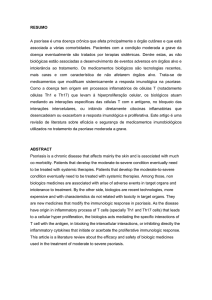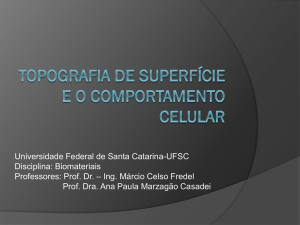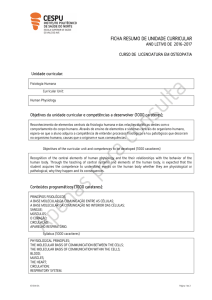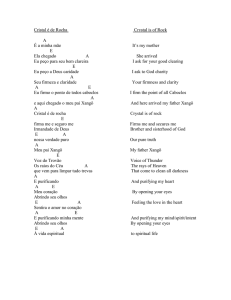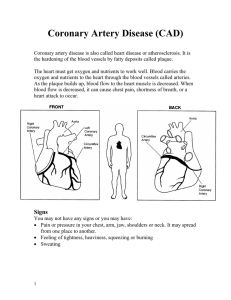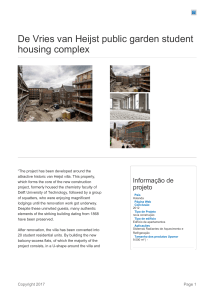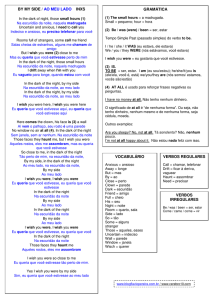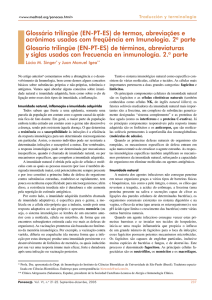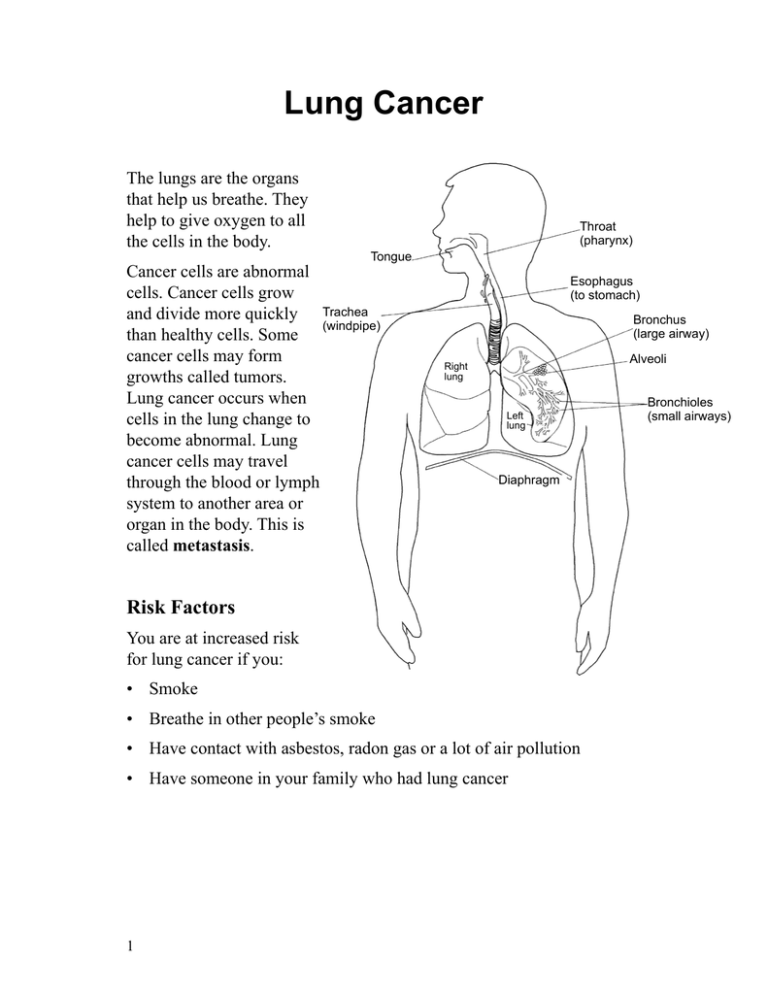
Lung Cancer
The lungs are the organs
that help us breathe. They
help to give oxygen to all
the cells in the body.
Throat
(pharynx)
Tongue
Cancer cells are abnormal
cells. Cancer cells grow
and divide more quickly Trachea
(windpipe)
than healthy cells. Some
cancer cells may form
growths called tumors.
Lung cancer occurs when
cells in the lung change to
become abnormal. Lung
cancer cells may travel
through the blood or lymph
system to another area or
organ in the body. This is
called metastasis.
Esophagus
(to stomach)
Bronchus
(large airway)
Alveoli
Right
lung
Left
lung
Diaphragm
Risk Factors
You are at increased risk
for lung cancer if you:
• Smoke
• Breathe in other people’s smoke
• Have contact with asbestos, radon gas or a lot of air pollution
• Have someone in your family who had lung cancer
1
Bronchioles
(small airways)
Câncer de pulmão
Os pulmões são os órgãos
que nos ajudam a respirar.
Eles nos ajudam a levar
oxigênio a todas as células
do corpo.
Garganta
(faringe)
Língua
As células cancerígenas
Traquéia
são células anômalas.
As células cancerígenas
crescem e se dividem
mais rapidamente que as
células saudáveis. Algumas
células cancerosas crescem,
formando tumores. O
câncer de pulmão ocorre
quando as células no
pulmão se modificam e
se tornam anômalas. As
células cancerígenas podem
se disseminar através do
sangue ou do sistema
linfático e atingir uma outra
área ou órgão do corpo. Isto
é chamado de metástase.
Esôfago
(para o estômago)
Brônquios
(grandes vias
aéreas)
Alvéolos
Pulmão
direito
Pulmão
esquerdo
Diafragma
Fatores de risco
O risco de desenvolver câncer de pulmão será maior se você:
• Fuma
• Respira fumaça de cigarro de terceiros
• Entra em contato com amianto, gás radônio ou muita poluição do ar
• Tem alguém na família que teve câncer de pulmão
Lung Cancer. Portuguese.
1
Bronquíolos
(pequenas
vias aéreas)
Signs
Early lung cancer often causes no signs. See your doctor is you have any
of these signs:
• Cough that does not go away
• Coughing up blood
• Shortness of breath
• Wheezing
• Loss of appetite and weight loss
• Feeling very tired
Types of Lung Cancer
There are 2 main types of lung cancer. Each type grows, spreads and is
treated differently.
• Non-Small Cell Lung Cancer – This is the most common type of lung
cancer. It grows and spreads more slowly.
• Small Cell Lung Cancer – This type of lung cancer grows and spreads
more quickly.
Your Care
Your doctor will give you a physical exam and look at your lungs with
tests such as:
• A chest x-ray
• Computerized Tomography (CT) scan
• Magnetic Resonance Image (MRI)
• Positron Emission Tomography (PET) scan
2
Sintomas
No estágio inicial, o câncer de pulmão geralmente não apresenta
sintomas. Faça uma consulta com o seu médico se você tiver quaisquer
destes sintomas:
• tosse que não passa;
• tosse com sangue;
• falta de ar;
• chiado;
• perda de apetite e peso;
• sensação de cansaço extremo.
Tipos de câncer de pulmão
Há dois tipos principais de câncer de pulmão. Cada tipo cresce, espalhase e é tratado de forma diferente.
• Células não pequenas – este é o tipo mais comum de câncer de
pulmão. Ele cresce e se espalha mais lentamente.
• Células pequenas – este tipo de câncer de pulmão cresce e se espalha
mais rapidamente.
Cuidados necessários
Seu médico o examinará e irá avaliar os seus pulmões a partir de exames
como:
• radiografia do tórax;
• tomografia computadorizada (TC);
• ressonância magnética (RM);
• tomografia por emissão de pósitrons (TEP).
Lung Cancer. Portuguese.
2
Also, you may have a biopsy done. Tiny samples of the tumor called
a biopsy are taken to find what type of lung cancer is present. This
information will help your doctor plan your treatment. Treatment options
will be discussed with you. Common treatments include:
• Surgery to remove the tumor and nearby tissue
• Radiation therapy to destroy cancer cells
• Chemotherapy medicines to destroy cancer cells
• A combination of the these treatments
Talk to your doctor or nurse about your questions and concerns.
2008 – 6/2012 Health Information Translations
Unless otherwise stated, user may print or download information from www.healthinfotranslations.org for personal, non-commercial use only. The medical information
found on this website should not be used in place of a consultation with your doctor or other health care provider. You should always seek the advice of your doctor or
other qualified health care provider before you start or stop any treatment or with any questions you may have about a medical condition. The Ohio State University
Medical Center, Mount Carmel Health System, OhioHealth and Nationwide Children’s Hospital are not responsible for injuries or damages you may incur as a result of
your stopping medical treatment or your failure to obtain medical treatment.
3
Você também pode precisar fazer uma biópsia. Pequenas amostras do
tumor são retiradas para se descobrir qual tipo de câncer está presente
(este procedimento é chamado de biópsia). Esta informação ajudará
o seu médico a planejar o tratamento. As opções de tratamento serão
discutidas com você. Alguns tratamentos comuns são:
• cirurgia para retirar o tumor e o tecido adjacente (ao redor);
• radioterapia para destruir células cancerígenas;
• quimioterapia para destruir células cancerígenas;
• uma combinação destes tratamentos.
Fale com o seu médico para sanar dúvidas ou preocupações.
2008 – 6/2012 Health Information Translations
Unless otherwise stated, user may print or download information from www.healthinfotranslations.org for personal, non-commercial use only. The medical information
found on this website should not be used in place of a consultation with your doctor or other health care provider. You should always seek the advice of your doctor or
other qualified health care provider before you start or stop any treatment or with any questions you may have about a medical condition. The Ohio State University
Medical Center, Mount Carmel Health System, OhioHealth and Nationwide Children’s Hospital are not responsible for injuries or damages you may incur as a result of
your stopping medical treatment or your failure to obtain medical treatment.
Lung Cancer. Portuguese.
3

